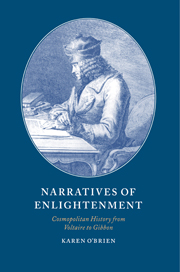Book contents
- Frontmatter
- Contents
- Acknowledgements and author's
- 1 Introduction: cosmopolitanism, narrative, history
- 2 Voltaire's neoclassical poetics of history
- 3 European contexts in Hume's History of England
- 4 William Robertson to the rescue of Scottish history
- 5 Robertson on the triumph of Europe and its empires
- 6 Emulation and revival: Gibbon's Decline and Fall of the Roman Empire
- 7 David Ramsay's sceptical history of the American Revolution
- Afterword
- Bibliography
- Index
- CAMBRIDGE STUDIES IN EIGHTEENTH-CENTURY ENGLISH LITERATURE AND THOUGHT
6 - Emulation and revival: Gibbon's Decline and Fall of the Roman Empire
Published online by Cambridge University Press: 28 October 2009
- Frontmatter
- Contents
- Acknowledgements and author's
- 1 Introduction: cosmopolitanism, narrative, history
- 2 Voltaire's neoclassical poetics of history
- 3 European contexts in Hume's History of England
- 4 William Robertson to the rescue of Scottish history
- 5 Robertson on the triumph of Europe and its empires
- 6 Emulation and revival: Gibbon's Decline and Fall of the Roman Empire
- 7 David Ramsay's sceptical history of the American Revolution
- Afterword
- Bibliography
- Index
- CAMBRIDGE STUDIES IN EIGHTEENTH-CENTURY ENGLISH LITERATURE AND THOUGHT
Summary
Introductory
Despite the falling cadence of its title, Edward Gibbon's The History of the Decline and Fall of the Roman Empire (6 vols.; 1776–88) exceeds the extinction of the Roman world in the West by some three volumes, and makes frequent allusions to the secure, cultivated Europe from which it observes the unstable, crumbling antique world. In Gibbon's story, the barbarian ancestors of eighteenth-century Europeans initially precipitated but ultimately broke the fall of the Roman Empire. This chapter will concentrate upon Gibbon's description, not of the decline and fall of the Romans, but the ascent and rise of those barbarians over more than a millennium of change in western Europe. For Gibbon's history is, in part, an incomplete civil history of medieval Europe to the beginning of the sixteenth century. Although not exactly a view of the progress of society in post-classical Europe, it has clear and deliberate affinities with the medieval histories of Hume and Robertson, and, to a lesser extent, of Voltaire. It tells a similar story about the formation of modern Europe, and engages profoundly, though critically, with Scottish stadial and narrative history.
A selective focus, in a study of eighteenth-century European identities, on this facet of Gibbon's narrative will inevitably fail to do justice to the scale of his work.
- Type
- Chapter
- Information
- Narratives of EnlightenmentCosmopolitan History from Voltaire to Gibbon, pp. 167 - 203Publisher: Cambridge University PressPrint publication year: 1997

